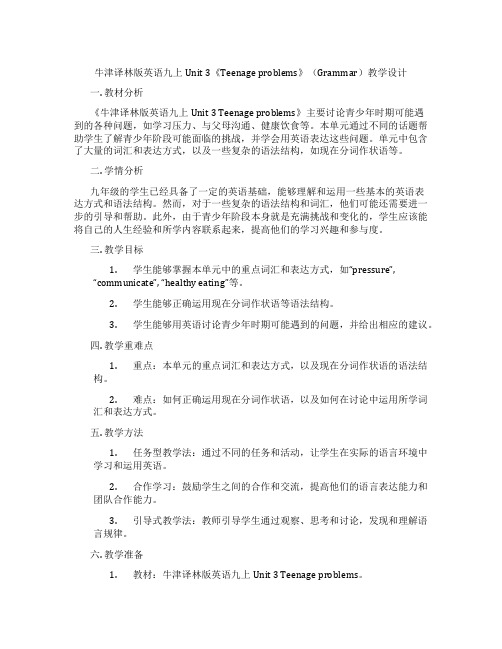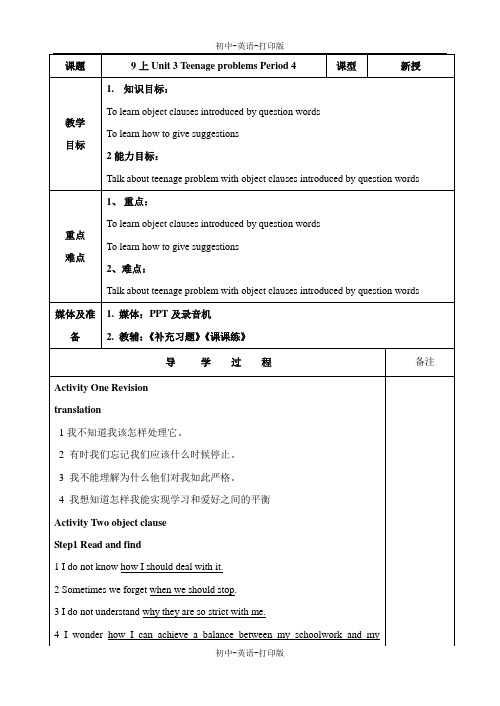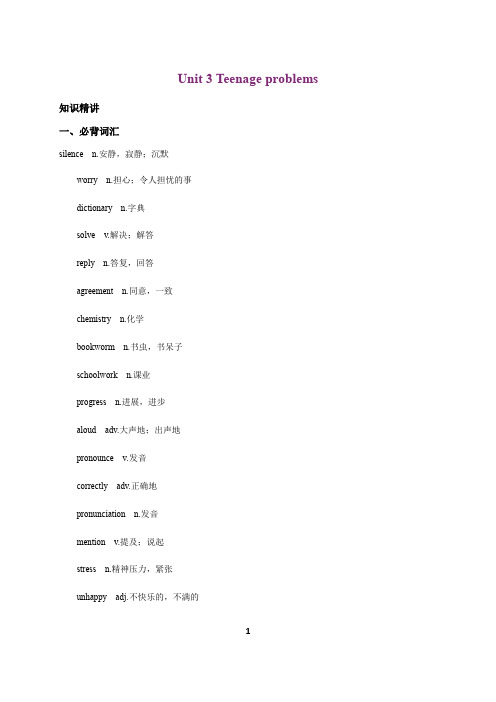牛津译林版-英语-九上-3单元 Teenage problems Grammar(2)精品学案
牛津译林版英语九上Unit 3《Teenage problems》(Grammar)教学设计

牛津译林版英语九上Unit 3《Teenage problems》(Grammar)教学设计一. 教材分析《牛津译林版英语九上Unit 3 Teenage problems》主要讨论青少年时期可能遇到的各种问题,如学习压力、与父母沟通、健康饮食等。
本单元通过不同的话题帮助学生了解青少年阶段可能面临的挑战,并学会用英语表达这些问题。
单元中包含了大量的词汇和表达方式,以及一些复杂的语法结构,如现在分词作状语等。
二. 学情分析九年级的学生已经具备了一定的英语基础,能够理解和运用一些基本的英语表达方式和语法结构。
然而,对于一些复杂的语法结构和词汇,他们可能还需要进一步的引导和帮助。
此外,由于青少年阶段本身就是充满挑战和变化的,学生应该能将自己的人生经验和所学内容联系起来,提高他们的学习兴趣和参与度。
三. 教学目标1.学生能够掌握本单元中的重点词汇和表达方式,如“pressure”,“communicate”, “healthy eating”等。
2.学生能够正确运用现在分词作状语等语法结构。
3.学生能够用英语讨论青少年时期可能遇到的问题,并给出相应的建议。
四. 教学重难点1.重点:本单元的重点词汇和表达方式,以及现在分词作状语的语法结构。
2.难点:如何正确运用现在分词作状语,以及如何在讨论中运用所学词汇和表达方式。
五. 教学方法1.任务型教学法:通过不同的任务和活动,让学生在实际的语言环境中学习和运用英语。
2.合作学习:鼓励学生之间的合作和交流,提高他们的语言表达能力和团队合作能力。
3.引导式教学法:教师引导学生通过观察、思考和讨论,发现和理解语言规律。
六. 教学准备1.教材:牛津译林版英语九上Unit 3 Teenage problems。
2.多媒体教学设备:用于展示PPT和视频材料。
3.教学素材:与本单元主题相关的图片、视频等。
七. 教学过程1.导入(5分钟)通过提问方式引导学生谈论他们所知道的青少年时期的问题,激发学生的兴趣和参与度。
新牛津译林版九年级上册unit 3《teenage problems》grammar优秀教案(重点资料).doc

Unit3 Teenage problemsGrammarTeaching goals:1、知识目标:1)学习词汇:whom, silence, worry, method, solve, dictionary, reply, 2)学习词组:solve the problem, youth worker3)学习句子:Daniel does not know whom he should talk to.I need someone to share my worries with.Why don’t you let your parents know you need them?What/ How about choosing your hobby according to the time you have? Let’s write a letter to Mr Sigmund Friend.Shall we have a meeting about this?2、技能目标:1)学会运用连接代词和连接副词引导的宾语从句。
2)能够正确地向别人提出建议。
3、情感目标:通过学习努力使自己成为快乐活泼的少年。
Important and difficult points:1.通过学习努力使自己成为快乐活泼的少年2.知识目标+ 技能目标Teaching procedures:Step1:预习指导与检测见导学案Step2:展示目标见导学案Step3:课堂导学与互动任务一:什么是宾语从句宾语从句就是由一个句子来构成主句的宾语,并有一个连接词引导。
有哪些句子可以做宾语?一、连词(引导词)1. 当宾语从句是陈述句时(包括肯定句和否定句),连词由that引导,因为that 在从句中不作任何成分,也没有任何具体意思,因此在口语或非正式文体中常省略Lin Tao feels (that) his own team is even better.She says (that) she won’t take part in the sports meetingnext Sunday.Jim thought (that) the train was like a big moving party.He said (that) he would like to see the headmaster.在主句为动词be加某些形容词(如sorry, sure, afraid, glad等)作表语时,后面所跟的省略that的从句也可算是宾语从句I’m s orry (that)I don’t know .We’re sure (that) our team will win .I’m afraid (that) he won’t pass the exam .2. 一般疑问句做宾语宾语从句必须用________(陈述句结构叫陈述语序; 疑问句结构叫疑问语序)由if或whether引导的宾语从句。
牛津译林版-英语-九上-3单元 Teenage problems Grammar

难点
1、重点:
To learn object clauses introduced by question words
To learn how to give suggestions
2、难点:
Talk about teenage problem with object clauses introduced by question words
We give suggestions politely using structures such as
Why not…?
Why don’t you…?
What/How about…?
Let’s….
Shall we…?
Perhapsyou should…
(询问建议的方式,通过让学生回忆归纳,教师需点明的是标点符号和动词形式)
Step1Read and find
1Ido not knowhowIshould deal with it.
2 Sometimes we forgetwhen we should stop.
3 I do not understandwhy they are so strict with me.
4IwonderhowIcan achieve a balance between my schoolwork and myhobbies.
Translation: 1请告诉我,你什么时候去北京。
2 Tom问我放学后我想玩什么。
3他不知道什么时候完成这么多的家庭作业。
4我不知道我弟弟住在哪里。
Homework:
1 finish exercises in period 4
2 preview integrated skills
牛津译林版英语九年级上册Unit 3 Teenage problems Grammar (共31张PPT)

8
Kitty
n. 安静,沉默
I need silence when I’m
studying. I don’t know _w_h_e_r_eI
can find a quiet place.
Peter
I need someone to share
my worries with. I wonder
_w_h_o_/_w__h_o_m_ I should go to
for help. n. 担心,令人担忧的事
9
Amy
I have tried my best, but I don’t
understand w__h_y_ I still get low
marks.
Sandy
My parents often come home very late. Sometimes I don’t know
w__h_e_n_ I will see them.
10
Sometimes I’m careless. I
wonder _h_o__wI can be more
3. I believe that I have made a wise decision, so I won’t change my mind. 4. — I hope that all my dreams can come true.
— If you try your best, they will surely be realized. 5. — May I askif/whether you will come to our party this weekend?
Unit 3 Teenage problems-Grammar课件 译林牛津版九年级英语上册(36张

Unit 3 Teenage problems-Grammar课件译林牛津版九年级英语上册(36张PPT)(共36张PPT)GrammarUnit 3 Teenage problemsLearning Aims1. Master object clauses introduced by question words.2. The ways of giving suggestions.自学检测汉译英1.需要安静2.分享我的烦恼3.解决问题4.查找字典5.回复邮件need silenceshare my worriessolve the problemlook…up in a dictionaryreply to the emailRevision什么是宾语?宾语是动作、行为的对象,是动作的承受者。
宾语由名词、代词、不定式或相当于名词的词、短语来担任。
I like my teacher.(名词作宾语)I enjoy playing basketball.(动名词作宾语)I decide to study hard.(不定式作宾语)I know him .(代词作宾语)Translate the sentences.1. 我经常怀疑是否值得花如此多的时间在家庭作业上。
__________________________________________________________ 2. 我不能理解为什么他们对我如此严格。
___________________________________________________________ I often doubt whether it is worth spending so much time on homeworkI do not understand why they are so strict with me.Revision在复合句中用作宾语的从句叫做宾语从句。
Unit3TeenageproblemsGrammar课件牛津译林版英语九年级上册

Unit 3 Teenage Problems
Grammar
Simon’s problems
why they are so strict with him.
how he can achieve a balance between his schoolwork and his hobbies
when they should stop
C.how many bridges are there in Wuhan D.what will I study in Wuhan University
2.He told me (that) Summer
after Spring.
A. is
B. are
C. was
D. were
Pay attention
变,如以下句子:
Which woman is your mother? what is the matter with you? What is wrong with your machine? who broke the glass? What’s happening over there? What happened?
牛津译林版九年级上册Unit 3《Teenage problems》(Grammar)教学设计

牛津译林版九年级上册Unit 3《Teenage problems》(Grammar)教学设计一. 教材分析《牛津译林版九年级上册Unit 3 Teenage problems》主要讨论了青少年时期可能遇到的各种问题,如家庭、学校、朋友以及自我认知等方面。
通过本节课的学习,学生能够掌握一般现在时态的被动语态,以及如何运用一般现在时态进行问题描述。
教材内容贴近学生生活,有利于激发学生的学习兴趣和积极性。
二. 学情分析九年级的学生已经具备一定的英语基础,能够运用一般现在时态进行简单描述。
但部分学生在语法方面仍存在一定的困难,如对一般现在时态的被动语态掌握不扎实。
此外,学生对青少年时期的问题有一定的了解,但可能缺乏对这些问题深度思考和讨论的机会。
三. 教学目标1.知识目标:–能熟练运用一般现在时态的被动语态进行描述。
–掌握与青少年问题相关的词汇和短语。
2.能力目标:–能用英语描述和讨论青少年时期的问题。
–提高学生的团队合作和沟通能力。
3.情感目标:–培养学生对青少年问题的关注和理解。
–引导学生正确面对和处理青少年时期的问题。
四. 教学重难点•一般现在时态的被动语态。
•与青少年问题相关的词汇和短语。
•一般现在时态的被动语态在实际语境中的运用。
•如何在讨论中正确表达自己的观点和情感。
五. 教学方法1.情境教学法:通过设定情境,让学生在实际语境中运用所学知识。
2.任务型教学法:通过完成各种任务,提高学生的实际运用能力。
3.合作学习法:鼓励学生分组讨论,培养团队合作精神。
六. 教学准备1.教学PPT:包括教材内容、语法点讲解、练习题等。
2.教学素材:与青少年问题相关的图片、视频等。
3.分组名单:便于学生进行合作学习。
七. 教学过程1.导入(5分钟)–利用与青少年问题相关的图片或视频,激发学生的兴趣。
–引导学生用英语自由谈论青少年时期遇到的问题。
2.呈现(10分钟)–介绍一般现在时态的被动语态的用法。
–通过例句和练习,让学生掌握一般现在时态的被动语态。
牛津译林版-英语-九上-牛津译林版九上英语 3单元 Teenage problems 知识点小结

Unit 3 Teenage problems 知识精讲一、必背词汇silence n.安静,寂静;沉默worry n.担心;令人担忧的事dictionary n.字典solve v.解决;解答reply n.答复,回答agreement n.同意,一致chemistry n.化学bookworm n.书虫,书呆子schoolwork n.课业progress n.进展,进步aloud adv.大声地;出声地pronounce v.发音correctly adv.正确地pronunciation n.发音mention v.提及;说起stress n.精神压力,紧张unhappy adj.不快乐的,不满的1二、重点词汇1. silence n.1). a period without any sound; complete quiet宁静;寂静例句:A loud crash of thunder broke the silence of the night.一声炸雷打破了夜晚的宁静。
2). a state of not speaking or writing or making a noise无声;沉默;缄默例句:Their mother's angry words reduced the children to silence.母亲生气的训斥让孩子们都默不作声了。
2. solve v.to find an answer to a problem思索,思考例句:to solve a problem 解决问题to solve a mystery/puzzle 揭开秘密/谜底3. aloud adv.in a voice loud enough to be heard4大声地;出声地例句:He read her letter aloud to the rest of the family.他把她的信大声读给家人听。
- 1、下载文档前请自行甄别文档内容的完整性,平台不提供额外的编辑、内容补充、找答案等附加服务。
- 2、"仅部分预览"的文档,不可在线预览部分如存在完整性等问题,可反馈申请退款(可完整预览的文档不适用该条件!)。
- 3、如文档侵犯您的权益,请联系客服反馈,我们会尽快为您处理(人工客服工作时间:9:00-18:30)。
_________________________________________________________
6. He works very hard. (用how改为感叹句)
_________________________________________________________
4、Wh疑问句:________________________________________
5、选择疑问句:________________________________________
6、反意疑问句:________________________________________
7、祈使句(肯定):________________________________________
6. Do you go there by bike or on foot? ___________________________
7. What would you like, tea or coffee? ___________________________
8. He is often late for the class, isn’t he? __________________________
3. You must be kind to the elderly. (改为我祈使句)
_________________________________________________________
4. You mustn’t play with fire.(改为祈使句)
_________________________________________________________
9. Don’t smoke here. ____________________________
10. How busy they are! ____________________________
二、大家学习英语多年了,你们能记起我们英语里有哪些句型吗?请试着写一写:________________________________________________
二、请大家按类型写出句子:
1、陈述句(肯定)________________________________________
2、陈述句(否定)________________________________________
3、一般疑问句:________________________________________
课堂交流展示
一、大家的预习作业都完成了吧!那你知道上面这些句子是哪一类?请归纳一下。请把句子的序号写在相应的横线上。
陈述句:_______疑问句:_______祈使句:_______感叹句:_______
二、如果你有问题的话,让我们一起来看一下课本的第52页,在那里也许你能找到答案。
那么你能写出对应的句子来吗?试一试!
3. Is your mother at work? ____________________________
4. Does Mary like living here? ____________________________
5. what is your father’s job? ____________________________
一、按要求完成下列句子。
1. There is some milk in the bottle. (改为否定句)
_________________________________________________________
2.Sandyhas long hair. (改为感叹句)
________________________________________________________
陈述句:____________________________________________
疑问句:____________________________________________
祈使句:____________________________________________
感叹句:____________________________________________
6. How hard he works!
7. You dislike this kind of books, don’t you?
8. Be quiet, will you?
二、略。
7. You dislike this kind of books. (改为反义疑问句)
_________________________________________________________
8. Be quiet.(改为反义疑问句)
_________________________________________________________
8、祈使句(否定):________________________________________
9、感叹句(how):________________________________________
10、感叹句(what):________________________________________
疑问句:____________________________________________
祈使句:____________________________________________
感叹句:____________________________________________
课堂达标检测
学习难点
能够熟练运用四种句型。
课前自学
一、翻译下列句子。
1. Tom is playing football. ____________________________
2. Tom is not good at playing football. ___________________________
三、我想,现在大家对这四种句型一定有所了解了,那么让我们一测试一下,请大家完成53页的练习。分组讨论一下,通过全组的努力,你们一定能完成的。
四、我想大家现在一定能了解这四种句型了,那么它们分别有什么特点呢?你能说一说吗?
陈述句:____________________________________________
总36课时
一、1. There isn’t any milk in the bottle.
2. What long hairSandyhas!
3. Be kind to the elderly.
4. Don’t play with fire.
5. I don’t think he will come.
九年级英语上册 Unit 3 Teenage problems Grammar(2)精品学案 牛津译林版
课题
9Aunit 3 Grammar 2
学习目标
知识目标
了解英语的四种句型(陈述句、疑问句、祈使句、感叹句)。
能力目标
能够识别四种句型。
情感目标
培养学习英语的兴趣。
学习重点
了解英语的四各句型(陈述句、疑问句、祈使句、感叹句)
